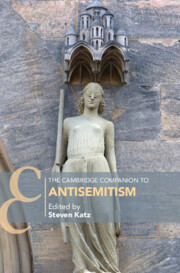Book contents
- The Cambridge Companion to Antisemitism
- Cambridge Companions to Religion
- The Cambridge Companion to Antisemitism
- Copyright page
- Contents
- Contributors
- Acknowledgments
- Introduction
- Part I The Classical Period
- Part II Medieval Times
- Part III The Modern Era
- 15 Martin Luther and the Reformation
- 16 The Enlightenment and Its Negative Consequences
- 17 Modern Antisemitism in Western Europe
- 18 Antisemitism in Late Imperial Russia and Eastern Europe through 1920
- 19 Marxism, Socialism, and Antisemitism
- 20A Antisemitism in Modern Literature and Theater
- 20B Antisemitism in Modern Literature and Theater
- 20C Antisemitism in Modern Literature and Theater
- 21 Antisemitism in America, 1654–2020
- 22 Antisemitism in the Weimar Republic and the Third Reich
- 23 New Islamic Antisemitism, Mid-19th to the 21st Century
- 24 Anti-Zionism as Antisemitism
- 25 New Issues
- 26 Antisemitism in Social Media and on the Web
- 27 Theories on the Causes of Antisemitism
- Appendix The International Holocaust Remembrance Alliance: Working Definition of Antisemitism
- Index
- Cambridge Companions to Religion
- References
16 - The Enlightenment and Its Negative Consequences
from Part III - The Modern Era
Published online by Cambridge University Press: 05 May 2022
- The Cambridge Companion to Antisemitism
- Cambridge Companions to Religion
- The Cambridge Companion to Antisemitism
- Copyright page
- Contents
- Contributors
- Acknowledgments
- Introduction
- Part I The Classical Period
- Part II Medieval Times
- Part III The Modern Era
- 15 Martin Luther and the Reformation
- 16 The Enlightenment and Its Negative Consequences
- 17 Modern Antisemitism in Western Europe
- 18 Antisemitism in Late Imperial Russia and Eastern Europe through 1920
- 19 Marxism, Socialism, and Antisemitism
- 20A Antisemitism in Modern Literature and Theater
- 20B Antisemitism in Modern Literature and Theater
- 20C Antisemitism in Modern Literature and Theater
- 21 Antisemitism in America, 1654–2020
- 22 Antisemitism in the Weimar Republic and the Third Reich
- 23 New Islamic Antisemitism, Mid-19th to the 21st Century
- 24 Anti-Zionism as Antisemitism
- 25 New Issues
- 26 Antisemitism in Social Media and on the Web
- 27 Theories on the Causes of Antisemitism
- Appendix The International Holocaust Remembrance Alliance: Working Definition of Antisemitism
- Index
- Cambridge Companions to Religion
- References
Summary
Despite their aspirations to shine the light of reason on the world, and with notable exceptions, the thinkers of the Enlightenment provided posterity with numerous indictments of the Jewish character and religion. How much of an influence the writings of such figures as Voltaire and Kant had on the subsequent evolution of antisemitism remains a subject of scholarly debate.
- Type
- Chapter
- Information
- The Cambridge Companion to Antisemitism , pp. 291 - 306Publisher: Cambridge University PressPrint publication year: 2022

